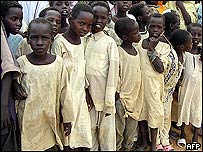
More than a million people have fled their homes
|
About 70,000 displaced people are thought to have died in Sudan's Darfur region since March, mainly from disease and malnutrition, a UN official says.
David Nabarro, head of the World Health Organisation's health crisis group, said up to 10,000 people were still dying in refugee camps each month.
He said the mortality rate would not fall unless more urgent aid was sent.
The African Union has announced it will begin deploying armed peacekeeping troops to Darfur this weekend.
The union's chairman, President Olusegun Obasanjo of Nigeria, said a Rwandan battalion would arrive on Sunday, to be followed by Nigerian troops.
The plan was to have the 4,500-strong force on the ground by the end of November, a spokesman for Mr Obasanjo said.
Words and deeds
The overall death toll was put by the WHO at 50,000 last month.
Mr Nabarro said aid agencies had so far received only half of the $300m needed to cope with the crisis.
"We are running on a threadbare, hand-to-mouth existence, and if the plight of these people in Darfur is as important to the international community as it seems to be, then we would have expected more long-term support," Mr Nabarro said.
 |
DARFUR CONFLICT
More than 1.5m displaced
About 70,000 dead since March
More at risk from disease, starvation and lack of aid
Arab militias accused of ethnic cleansing
Sudan blames rebels for starting conflict
|
He urged the international community to provide money rather than simply show concern over the plight of some 1.4m people in Darfur.
"It's amazing that we still can't seem to get the money that is required," he said.
Mr Nabarro added that media coverage and the speeches of politicians suggested the crisis was important to the international community, but this concern had not been converted into resources and the price was being paid in death.
The estimate only covered the period since March, when aid agencies were given access to the region.
Last month, Mr Nabarro said that only about 15% of deaths were due to attacks and violence, while the rest were caused by the poor sanitation and diseases.
A succession of high level visitors have been to Sudan recently, including US Secretary of State Colin Powell and British Prime Minister Tony Blair.
But the most significant international response to the crisis has come from the AU which has supplied a 300-strong ceasefire monitoring mission, the BBC's Mark Doyle reports.
However, members of that mission admit that it is too small and inadequately supplied, our correspondent says.
Troops deployment
On Friday, Nigerian President Olusegun Obasanjo said 4,500 troops from the AU were expected to be deployed in Darfur by the end of November.
Mr Obasanjo - who is currently serving as chairman of the AU - said in a statement that the AU force would be made up of five battalions.
He said one battalion from Rwanda would be deployed in Darfur by Sunday, while a Nigerian battalion will be on the ground by 30 October.
Mr Obasanjo said he expected three other countries to provide the remaining three battalions.
It was not immediately clear which other African nations would supply the troops.
The conflict between government forces and rebel groups broke out last year.
The US has accused the government in Khartoum of failing to prevent atrocities against civilians by the pro-government Janjaweed Arab militia.
Sudan denies the allegations.